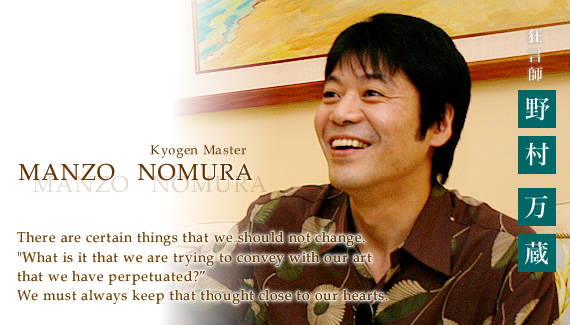
The 15th Annual Honolulu Festival (2009)
Feature Interview with Manzo Nomura
Manzo Nomura, who is a Kyogen performer that performed in the Tenshu Monogatari and Daidengaku with the actress Keiko Matsuzaka at the 15th Annual Honolulu Festival.
He is one of the performers that preserves and passes on their tradition of Kyogen as the Japanese culture and performing arts. We had an opportunity to interview him and ask about the various things he’s being trying to implement in the Kyogen play regardless of its formality.
— How was performing at the Honolulu Festival?
Normally, any performance requires thorough training then you borrow one stage. However, there were various booths inside the spacious venue, where it was crowded with people. Also, the performing groups instantly changes after each performance on stage. I felt the pressure that I don’t usually feel which was such a rare experience was for me. Before the show, I was wondering about how excited the audience were. When I heard the loud sound of the taiko drums, I felt like “Ok, let us rock the stage too!” Not to mention, the Tenshu Monogatari is a play, so I was worried if the audience may enjoy it in such a crowded place. At the same time, we felt the motivation as I explained earlier like “Let’s do this!” It can be described as “tachi-ai shoubu” or duel in Japanese, where you suddenly stand up to fight. I felt that kind of pressure during our performance. I felt very satisfying when I saw that all the seats were packed with audience and they were enjoying even though they didn’t know the Japanese language which can be said in both of our shows. It felt so great!
— Did you guys planned for anything exclusively special upon performing in Hawaii?
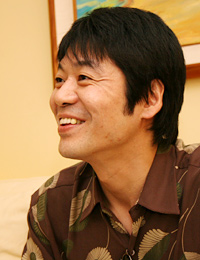
We planned to say aloha in the beginning of the Tenshu Monogatari. In addition, we have planned to shout the name Humuhumunukunukuapua’a (the official state fish of Hawaii) in our Daidengaku and we wore lei as well. I think that to participate in the Honolulu Festival means of course it is about cultural exchange. When we go perform overseas, we incorporate the local culture and language of the visited country along with the Japanese culture. This may be exaggerating but recently, I feel like it is natural to make it symbolic by incorporating various cultures. Of course we can’t make change in the formal dramas but on the other hand, the Kyogen has a strong comedic element which makes it possible to alter things in the play.
— Speaking of comedy, you are performing with a comedian right?
Yes, I’m currently performing in the Gendai Kyogen with Nanchan (Kiyotaka Nanbara) from the famous comedian duo “Ucchan Nanchan” which is very educational.
Several years ago, there was a TV program where Nanchan and other comedians were challenging to perform the Kyogen, which my long-gone brother (Mannojo Nomura) taught them. Afterwards, the show ended but later, my brother and Nanchan discussed “If we can incorporate comical element into the Kyogen play and make a new contemporary genre of it, that will be interesting. Let’s do this.” But unfortunately, my brother had deceased. Despite of it, Mr. Nanbara was still passionate about it, so we’ve started our Gendai Kyogen. Our new genre is very humorous which has been 4 years. You will know what I’m talking about if you watch our show. Also, Nanchan was saying that he wants to perform the Kyogen around the world so eventually, he may be coming to Hawaii in few years (laughs). Our show is very funny that you will be laughing until your stomach hurts. It is different kind of humor than the comedy programs you often seen on TV.
— How do you combine classic and contemporary comedy as one?
The Kyogen is the oldest form of comedy in Japan. It tells a story of a man’s failure in their daily lives which also depicting the strengths and weaknesses through comedy. On the other hand, those who cannot get used to the style of the Kyogen play may feel that the expressions are too old or the tempo is very slow compared to the Japanese comedy today.
The very first thing on our Gendai Kyogen is to show what the Kyogen itself is all about. We use the plot which is almost the same as the original, but we have switched the characters to people of modern days which the comedians will be performing. Then, we incorporate the forms or moves of the Kyogen with some comical elements. Last time, we used slippers for slapping to create a comical effect (laughs).
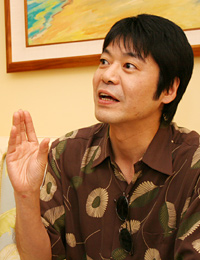 These days, the comedy is about making fun of others or saying some vulgar things. Some are simply wearing an eccentric costume and competing with other comedians. The Kyogen is universal, which incorporate classic and contemporary expressions to expand one’s imagination. But also, we add the old and new comical elements together as one.
These days, the comedy is about making fun of others or saying some vulgar things. Some are simply wearing an eccentric costume and competing with other comedians. The Kyogen is universal, which incorporate classic and contemporary expressions to expand one’s imagination. But also, we add the old and new comical elements together as one.
The Kyogen is a classic theater that makes the audience visualize the story from scratch. Its generosity is similar to having a mixed hot pot or any kind of hot pot. No matter what goes ino it, you will still be wondering “what’s inside?” and enjoy your food. The Kyogen is about expanding your interest so I think it will develop more in the future.
— I thought you guys are focused to show some skills and forms of the Kyogen.
We are creating an atomsphere and showing our skills in a unique costume. At the same time, if we exclude contemporary elements, we are just simply showing that the comedians are challenging to perform the Kyogen. We sometimes act the clown like the contemporary comedy which I enjoy our interactions on stage. One of our shows titled “What if the Kyogen and contemporary Japanese comedy got married?” consists of a fusion between the classic and contemporary comedy as if they are married couple. They fight but also get back together in peace like a funny couple, where the audience may feel that they are either unmatched or surprisingly matched couple.
— The Izumi School of Kyogen has a long history of 300 years. Is there anything that shouldn’t be changed?
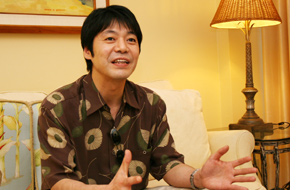 It’s difficult to draw a line between what can be changed and what can’t be changed. Ultimately, it is up to the leader to make those decisions. The simplest way to say this is what kind of message you are trying to convey to the audience. This attitude shouldn’t be changed.
It’s difficult to draw a line between what can be changed and what can’t be changed. Ultimately, it is up to the leader to make those decisions. The simplest way to say this is what kind of message you are trying to convey to the audience. This attitude shouldn’t be changed.
We do make change on our script and moves. Then you may wonder if western clothes are appropriate to be worn on stage, which is difficult question. They may be appropriate as an experiment, but we can’t say “we won’t wear any traditional Japanese clothes in our Kyogen play. From now on, we would like to perform in western clothes instead.” If that was the case, then I think the audience will dislike that idea as well. Next you may wonder if the Kyogen performer can be talking fast during their performance or whether the complex expressions of Old Japanese can be replaced with the modern Japanese language. They are difficult questions to answer. The language continuously changes by generation but they are words that should be preserved. Despite of it, we do change some words in our play to please the audience. Hence, they are many that change the expressions on the script of their forefathers by pasting the Japanese paper on top of words and revising them or drawing red lines then cutting them.
They are history of unity and hard training which were fostered by our forefathers. Our Izumi School of Kyogen has a history of 300 years, but the Noh and Kyogen are 600 years old. Also, the other classic theaters were existed way back then, so it is endless to discuss about its history. What’s important is that we make changes by considering what is necessary for the human beings to live.
— Which means if you say we are going to make a change right now, then its possible?
I can change the style of Manzo Nomura family by my own words. At the same time, there is a fear that our forefathers will beat me in afterlife, which my brother was saying it as well (laughs). On the other hand, they may beat me because I’ve destroyed the Kyogen as a result of no change. If it was destroyed then that means its a failure. However, if I make changes, our forefathers may scold “What a fool! What have you done making all these unnecessary changes!” Hence, I’m in the position where it requires balancing out between what can be changed and what can’t be changed by looking at the big picture of the Kyogen without being bias and also, making a decision by considering various perspectives.
— I bet you are under so much pressure as being Manzo Nomura of the 9th generation, which has a history of 300 years.
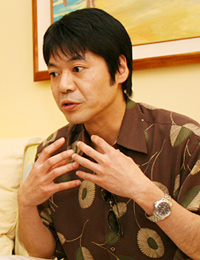 I was about to die the first year when I succeeded the name of Manzo. The people around me told me that I’m not the one because of how I talk and how I look. They told me “You’re not Manzo, why do you look so proud?”
I was about to die the first year when I succeeded the name of Manzo. The people around me told me that I’m not the one because of how I talk and how I look. They told me “You’re not Manzo, why do you look so proud?”
Being used to something can mean negative but also positive. I was gradually getting used to my name and position. As we discussed earlier about ‘what can be changed and what can’t be changed’, there is a time where I have to make an immediate decision. Such judgement can be developed by one’s experience. There are some that question the style of our Daidengaku and Ms. Matsuzaka’s Tenshu Monogatari as well as our Gendai Kyogen because of their irregularity. Then, I can think of various ways to make them better by adding new concept or considering the appropriateness. Once again I realized that the experience is important.
— The other day, Keiko Matsuzaka expressed that she especially feels comfortable whenever she performs on stage with you. What do you think she meant by that?
Hmm… I think that’s because I’m not as aggressive as the other actors. Of course there is a dilemma. Let’s say that I’m maintaining my composure on the outside but striving aggressively on the inside.
The classic theater involves strict training, where it requires one to be motionless and quiet for a long period. Even a slight movement will affect the performers around you. Yet, I can’t stay confident all the time. There are times that I feel anxious during my performance as well.
I can’t answer the difference between our Kyogen play and others because that what the audience can feel from watching our performance. Sometimes I feel educational from performing as well. After all, experienced performers have great influence to each other in fostering their talent.
— Back to the topic of the Daidengaku, can you tell us more about it?
Originally, the Daidengaku was a ritual for worshiping gods. However, it can be boring to the audience if it’s presented in the original form of worship. Hence, it is necessary to include entertainment elements to the performance in this current era.
15 or 20 years ago, we first conducted our Daidengaku in the original form, where most of the actors were professionals and they showed such a precise and beautiful dance. Then gradually, we started to perform in various places, which we incorporated local elements accordingly to the area and began interacting with the communities as part of our show. Our first Daidengaku was beautiful yet we scrapped it. Gradually, we started to adopt many new concepts to reshape our form. Perhaps it is distorted a little from the original meaning of ritual, but we are steadily increasing the number of our repertoire by adopting and testing new ideas.
On the other hand, we can simply be performing the original form with precision as well. If you can perform the basic of your form and you are well-aware of the meaning behind your new idea, then you can add, delete and do anything with it. I won’t say I’m managing all of them but at the same time, I’m the leader that first appear and perform as “Taaruji (landowner)” in the Daidengaku. Also, I have to make prime decisions since I’m involved from the beginning and my brother is gone. Hence, I let the communities, pros, semi-pros to participate. They are like the layers of a pyramid in my mind because they are supporting our performance to become successful. Therefore, the “leader” is an important role.
— What do you think the future holds for the Daidengaku as well as the Tenshu Monogatari in the next 5 or 10 years? Also, what plans do you have for them?
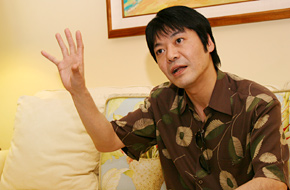 It is difficult to think separately between those two plays, but the Daidengaku has a history of almost 20 years and I think we need to go back to its origin. As I explained earlier, we need to reconsider its meaning as a ritual for worshiping gods, which I want the people who are involved to recognize about it. Also, I would like to provide more opportunity for the communities to perform in the Daidengaku and increase its entertainment factor. I think it is a time for a change.
It is difficult to think separately between those two plays, but the Daidengaku has a history of almost 20 years and I think we need to go back to its origin. As I explained earlier, we need to reconsider its meaning as a ritual for worshiping gods, which I want the people who are involved to recognize about it. Also, I would like to provide more opportunity for the communities to perform in the Daidengaku and increase its entertainment factor. I think it is a time for a change.
In regards to the Tenshu Monogatari, Ms. Matsuzaka has a strong will so I have to stick to her like the live sharksucker (laughs). Anyways, that was a joke but I thought this show will be organized as a drama. At first, it was developed as a recitation, which later changed to a Reader’s Theater. Then gradually, the acting was emphasized than the reading. Lastly, we took out some of the parts that we’ve adopted and say like let’s just perform as a recitation (laughs). Those who are passionate are cooperating and suggesting constructive ideas to each other. I think it is enjoying to depict the Tenshu Monogatari in various ways, which the actors won’t get bored as well.
— So that means we can expect to see various changes in the future. We are looking forward to it. Thank you very much for sharing your interesting story with us today.
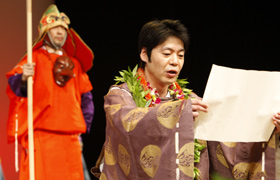
Manzo Nomura is performing as Taaruji (landowner)
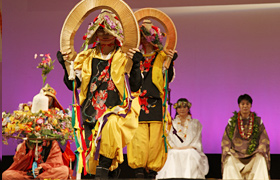
The actors are dancing in front of Keiko Matsuzaka and Manzo Nomura.
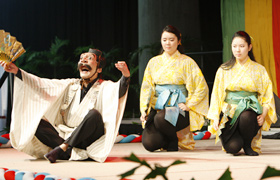
During the scene of “Shunobanbou (red ghost)” with Keiko Matsuzaka, her daughter Monet and Marisa performed as the handmaids in
Tenshu Monogatari.
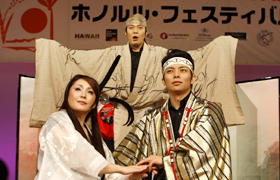
Manzo Nomura performed the samurai named Touroku. His dignified voice resonated throughout the venue.

 日本語
日本語





